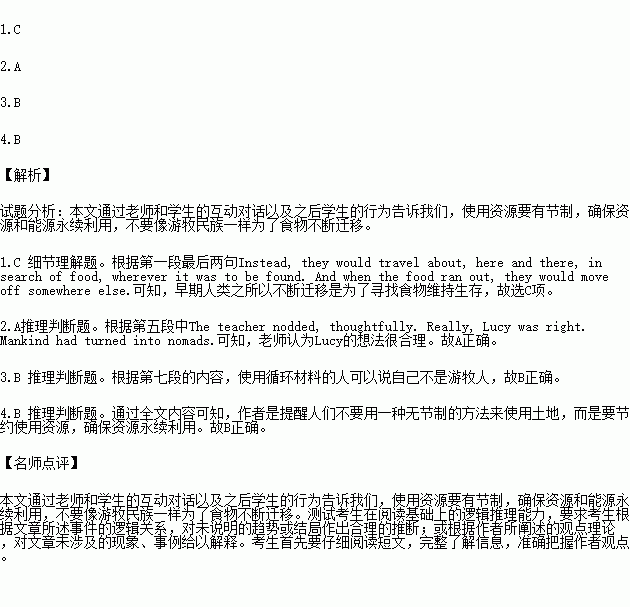题目内容
One day,Mr.Arnold was teaching a lesson,and things were going as normally as ever.He was explaining the story of mankind to his pupils.He told them that,in the beginning,men were nomads(游牧人);they never stayed in the same place for very long.Instead,they would travel about,here and there,in search of food,wherever it was to be found. And when the food ran out,they would move off somewhere else.
He taught them about the invention of farming and keeping animals.This was an important discovery,because by learning to cultivate(耕作)the land,and care for animals,mankind would always have food steadily available.It also meant that people could remain living in one place,and this made it easier to set about tasks that would take a long while to complete,like building towns,cities,and all that were in them.All the children listening were attracted by this story,until Lucy jumped up:
“And if that was so important and improved everything so much,why are we nomads all over again,Mr.Arnold?”
Mr.Arnold didn't know what to say. Lucy was a very intelligent girl.He knew that she lived with her parents in a house,so she must know that her family were not nomads;so what did she mean?
“We have all become nomads again,” continued Lucy.“The other day,outside the city,they were cutting the forest down. A while ago a fisherman told me how they fish.It's the same with everyone:when there's no more forest left, the foresters go elsewhere,and when the fish run out, the fishermen move on.That's what the nomads did,isn't it?”
The teacher nodded,thoughtfully. Really,Lucy was right. Mankind had turned into nomads. Instead of looking after the land in a way that we could be sure it would keep supplying our needs,we kept developing it until the land was bare.And then off we would go to the next place! The class spent the rest of the afternoon talking about what they could do to show how to be more civilized.
The next day everyone attended class wearing a green T?shirt,with a message that said,“I am not a nomad!”
And,from then on,they set about showing that indeed they were not.Every time they knew they needed something,they made sure that they would get it using care and control.If they needed wood or paper,they would make sure that they got the recycled kind.They ordered their fish from fish farms,making sure that the fish they received were not too young and too small.They only used animals that were well cared for,and brought up on farms.
And so,from their little town,those children managed to give up being nomads again,just as prehistoric men had done so many thousands of years ago.
1.Why would early humans travel about in the beginning?
A.To experience different lifestyles.
B.To go sightseeing in different places.
C.To find what they could to feed themselves.
D.To do more exercise to build themselves up.
2.In the teacher's opinion,Lucy's argument was________.
A.reasonable B.ridiculous
C.puzzling D.shocking
3.Which of the following agrees with the message “I am not a nomad”(Paragraph 7)?
A.People eat young fish for its delicious taste.
B.People use recycled materials as much as possible.
C.Fishermen move elsewhere when there is no fish left.
D.Foresters leave the place where wood is not available.
4.The writer tries to make us believe that________.
A.mankind has been progressing mainly through traveling about
B.it's unwise for mankind to use the land in an uncontrolled way
C.it's quite good for students to learn more about the history of mankind
D.teachers should encourage students to voice their own opinions
 名师指导期末冲刺卷系列答案
名师指导期末冲刺卷系列答案
